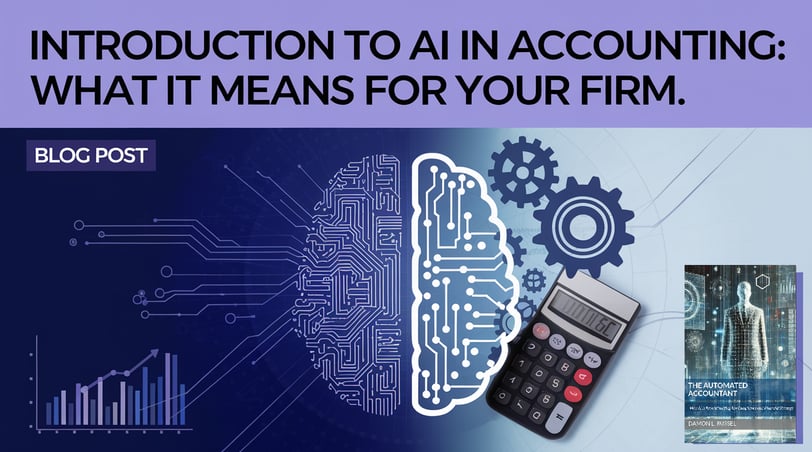AI in Accounting: What it Means for Your Firm
Discover how AI is revolutionizing the accounting industry, and what that means for your firm. This blog explores the definition of AI in accounting, potential impact on your firm, and addresses common fears like job displacement, emphasizing that AI enhances rather than replaces accounting roles.
STRATEGYAI POWERED ACCOUNTING BOOK SERIES
Damon L. Russel
10/28/20243 min read


Introduction to AI in Accounting: What It Means for Your Firm
AI is transforming the world, and accounting firms are not immune to these changes. In my book, The Automated Accountant, I explore how AI is revolutionizing accounting practices, helping firms to become more efficient and focused on value-added services. As an accountant, you’ve probably heard a lot of buzz about artificial intelligence, but what does it really mean for your firm? Simply put, AI refers to technologies that can analyze data, identify patterns, and even learn from experience to improve their performance over time.
For accounting professionals, AI isn’t just another trend—it’s an opportunity to make processes more efficient and reduce manual workloads. AI can handle repetitive tasks like data entry, transaction categorization, and even aspects of tax compliance, freeing accountants to focus on more value-added activities, like providing strategic advice to clients.
In this blog, we'll explore what AI means for your firm and why it's worth getting on board with this transformative technology. We’ll also discuss some of the common fears surrounding AI, such as job displacement, and how AI is more about enhancement than replacement.
What Does AI Mean for Accounting Firms?
AI in accounting means automation, efficiency, and insight. Instead of spending hours manually categorizing expenses or reconciling accounts, AI can complete these tasks within minutes and with greater accuracy. But AI’s power goes beyond simple automation. It can identify patterns and trends that humans may miss, providing a deeper level of insight into a client’s financial situation.
For example, machine learning algorithms can analyze a firm’s historical data and generate forecasts that help accountants provide proactive advice. Instead of merely being reactive, accountants can use AI to offer forward-looking guidance that creates real value for their clients. AI allows firms to scale their services without a proportional increase in workload, meaning accountants can take on more clients while still delivering high-quality service.
Common Fears Surrounding AI in Accounting
Fear #1: Job Displacement A common fear is that AI will replace accountants. However, the reality is that AI is designed to handle tasks that are repetitive and data-intensive, which means accountants can focus on more complex, human-centered work. Advisory services, strategic financial planning, and personalized client interactions are irreplaceable elements of accounting that require empathy, judgment, and creativity—qualities AI cannot replicate.
Fear #2: Lack of Control Over AI Decisions Some accountants worry about a loss of control when AI systems are involved in decision-making. The key here is that AI is a tool—it provides insights, but the accountant makes the final call. Implementing explainable AI tools helps accountants understand how AI arrives at its conclusions, providing transparency and allowing professionals to confidently use AI in their work.
Fear #3: AI is Too Complex Another common concern is that AI is too complicated to understand or use effectively. Many modern AI solutions are designed to be user-friendly, often integrated seamlessly into existing accounting software. Accountants do not need to be data scientists to benefit from AI; they just need to understand how to use the tools available to them.
What You Will Learn from The Automated Accountant:
What artificial intelligence is and how it works in accounting
The benefits AI offers to firms, from efficiency to better insights
How AI can complement the role of accountants instead of replacing them
Actionable Items to Prepare for AI Adoption:
Reflect on which parts of your accounting practice are repetitive and time-consuming.
Research how AI tools might help automate those tasks.
Prepare questions about AI that you can discuss with your team.
Start your journey into AI with The Automated Accountant. Pre-order the e-book on Amazon today! [Pre-Order Link] Or, purchase the softcover version on November 30, 2024!
Explore
Discover the AI Powered Accounting ebook series.
Connect
Learn
damon.russel@aipoweredaccounting.com
360-218-6942
© 2024. All rights reserved.
